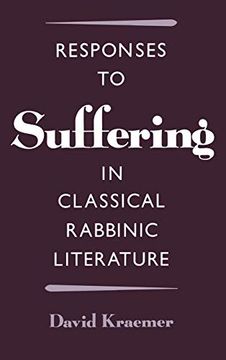Synopsis "Responses to Suffering in Classical Rabbinic Literature (in English)"
The existence of suffering poses an obvious problem for the monotheistic religions. Why does an all-powerful, benevolent God allow humans to suffer? And given that God does, what is the appropriate human response? In modern times Jewish theologians in particular, faced with the enormity of the Holocaust, have struggled to come to grips with these issues. In Responses to Suffering in Classical Rabbinic Literature, David Kraemer offers the first comprehensive history of teachings related to suffering in rabbinic literature of the ancient world. The age of formative Judaism was filled with suffering for its people. From the conquering of Palestine by Rome, and the destruction of the Temple at Jerusalem, to persecution at the hands of Hadrian, Jewish faith in a just and merciful God was tested repeatedly. The seemingly unjustified affliction elicited varying responses from rabbis. Beginning with the Mishnah (c. 200 C.E.), Kraemer examines traditions on suffering, divine justice, national catastrophe, and the like, in all major rabbinic works of late antiquity. The earliest rabbinic works, Kraemer shows, adhere to the "orthodox" biblical opinion which sees suffering as punishment for sins. But rabbis quickly began to record other explanations and responses. Palestinian rabbinic tradition, even at the end of this period, condemns any who would question or deny God's justice. In contrast, the Babylonian Talmud permits such questioning, itself giving voice to lengthy deliberations which reject the efficacy of suffering and question the justice of some suffering which humans are forced to endure. Bringing to bear recent methods in the history of religions, literary criticism, canonicalcriticism, and the sociology of religion, Kraemer offers a rich analysis of the development of attitudes that are central to and remain contemporary concerns of any religious society.

